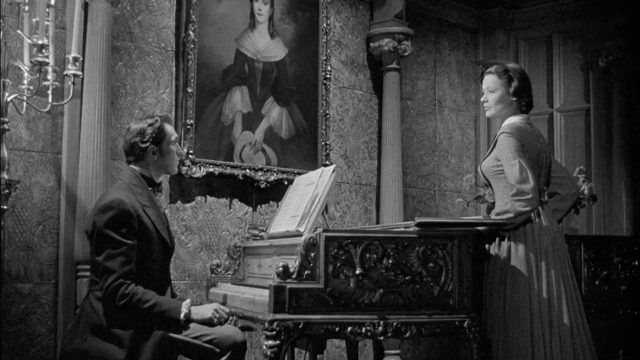6/10. Insufficient dragons.
Our symbolic dragon, as it were, is Nicholas van Ryn (Vincent Price), a patroon with a kind of sanctioned feudal holding in upstate New York. The year is 1844, but you wouldn’t know it from how Nicholas conducts his business. He can feign a belief that all men are created equal, but that pretense falls away the moment he’s back on his own land, at Dragonwyck. As far as he’s concerned, it’s his God-given right to have a village full of fractious tenant farmers paying to work his land for him, and no, he never intends to let them buy so much as an acre of it–and he can, of course, round up plenty of his aristocratic contemporaries to support this belief.
But Nicholas goes beyond the exploitation inherent in this particular social contract. It’s enough to be a patroon with an estate, he needs to feel like a king with an estate, maybe even a god with an estate; the scope of his domain never changes, because Nicholas is petty and his world is minuscule. He just wants to feel more and more power over the same old, same old, to go to a village festival and demand public tribute while he lolls about on a throne. And that’s exactly what he does, willfully ignoring the times as they change around him. (The working class here is politically engaged, but Nicholas shows no awareness of anything that’s not right in front of him–and often not even in that. He would get laughed right out of The Leopard.)
The only future Nicholas cares about is the future of his own bloodline. His young daughter, Katrine, can’t inherit and so is an obvious waste of his genes. (Halfway through, the film also loses all interest in her. Poor Katrine.) He needs a son, and his barren wife, Johanna (Vivienne Osborne), obviously can’t provide him with one. He looks for a new candidate elsewhere–maybe, just maybe, his wife will come down with a convenient fatal illness, happens all the time–and here his limitations are so stark that he almost feels like a parody of himself. With a whole world of women out there, Nicholas van Ryn goes to a great deal of trouble to make sure he gets his own cousin.
The cousin is Miranda Wells (Gene Tierney), and she’s the real protagonist and point-of-view character of the film, even if Nicholas is the better-defined figure. Tierney’s performance is strong–though she’s much better in the second half, when she gets to be vibrant and tragic; her perky farm-girl innocence isn’t as convincing. If Miranda doesn’t entirely feel of a piece with her background, her home life is nonetheless appealingly layered. Her parents are strictly religious, fairly abstemious, and distrustful of grandiosity, and it would be easy to paint them as a constraining force Miranda needs to escape from. As it is, we understand how she’s drawn to greater freedom and frivolity, but Ephraim (Walter Huston) and Abigail (Anne Revere) Wells feel real and often sympathetic (especially Abigail). Their convictions are sincere and treated with dignity, and they genuinely love their daughter and want the best for her. The more time we spend with Miranda, the more we see her family’s influence on her, and it’s usually part of her best qualities.
But here’s the problem with Dragonwyck: there’s too much going on, and too little is being done with it. There’s a rich amount of material to draw from, but the movie never makes anything out of it: it just sort of stirs the gold coins around and listens to them rattle, that’s all. It never commits to anything. This is most frustrating with its gothic elements: when you have an ominously named manor, a diabolical and wife-killing Vincent Price on a throne, a harpsichord-playing ghost, and a housekeeper with the Sight, you expect Nicholas’s secret activities in his secluded stone tower to be properly overripe. Maybe they involve even more dead wives, or witchcraft, or an imprisoned peasant. Maybe it’s supernatural, maybe it’s not, but it should certainly be dramatic. Instead, we find out that Nicholas is up there getting high. The revelation falls completely flat.
The film also has a bad habit of letting bits of its disorganized plot wander off. I already mentioned poor unloved Katrine, but the housekeeper who welcomes Miranda to Dragonwyck with a Haunting-style speech about how she’s doomed, doomed, doomed also vanishes. One particularly rebellious tenant gets framed for murder, and there’s some doubt about whether or not he’ll get a fair trial, despite Nicholas’s insincere promises–I guess he does, since we see him out and about later. At some point, we’re told a significant land reform law has passed, affecting Nicholas’s control of his estate, but that’s essentially the last we hear of it.
Like a lot of uneven films, Dragonwyck is fun to talk about, which is why I’ve gone on at such length. It’s hard to make any definitive statements about it, because its positive and negative attributes are so thoroughly muddled together. Sometimes it has two positives that wind up perversely cancelling each other out.
This was Joseph L. Mankiewicz’s first film, and as ungainly an effort as it is, it’s also a striking one. You could pull three movies out of this and make each one better and shapelier than Dragonwyck, and that speaks to both the film’s weaknesses and its merits. It’s worth watching at least once, if only so you can figure out which version of Dragonwyck you would have made in Mankiewicz’s shoes.
Dragonwyck is streaming on the Criterion Channel.

